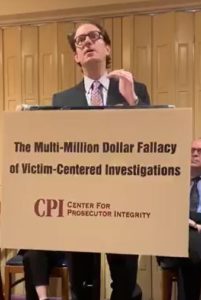Wrongful Convictions
An American Bar Association Task Force once reported the body of federal law has become so large that “there is no conveniently accessible, complete list of federal crimes.” That statement was made back in 1998. Ten years later, an estimated 4,450 federal crimes are on the books (1).
When there are too many crimes on the books, prosecutors are tempted to charge persons with an offense, even in the absence of probable cause. As judicial caseloads increase, due process protections become eroded. In the face of pressures to “convict at any cost,” some prosecutors resort to taking ethical short-cuts.
Not surprisingly, innocent persons end up being convicted of crimes they did not commit. Now, one in 100 adult Americans is behind bars, by far the highest number of any nation (2).
There are many areas of the law that have become over-criminalized. Following the 1994 passage of the federal Violence Against Women Act, for example, states enacted an estimated 1,500 new domestic violence laws from 1997 to 2003, an average of 30 new laws per state over that 7-year period (3):
- Under civil law, these statutes expanded the scope of partner aggression and reduced evidentiary requirements for issuance of restraining orders.
- Under criminal law, many jurisdictions established mandatory arrest and no-drop prosecution policies.
- Training programs for law enforcement personnel, prosecutors, and judges often emphasized the need to “err on the side of caution,” an admonition that in practice justifies aggressive criminal justice measures that remove the presumption of innocence.

